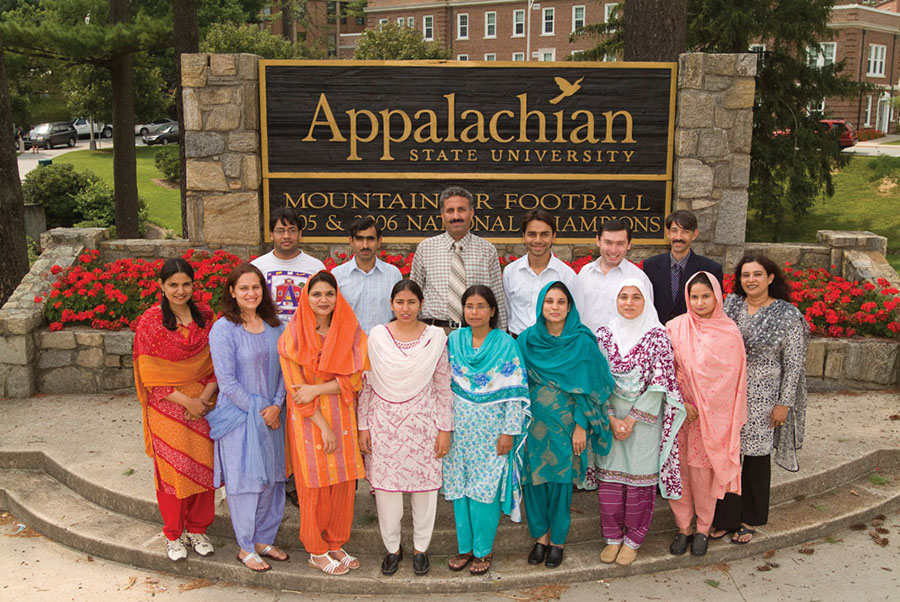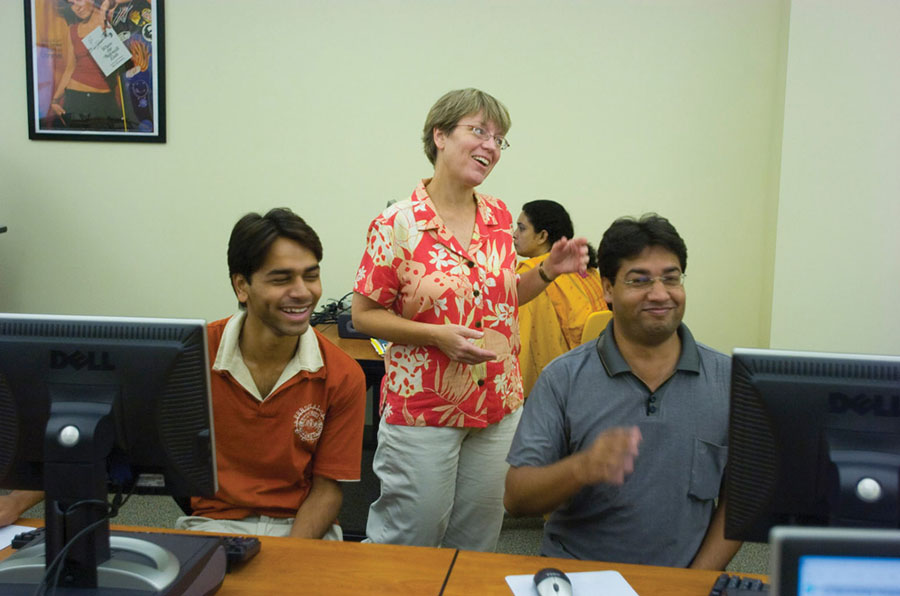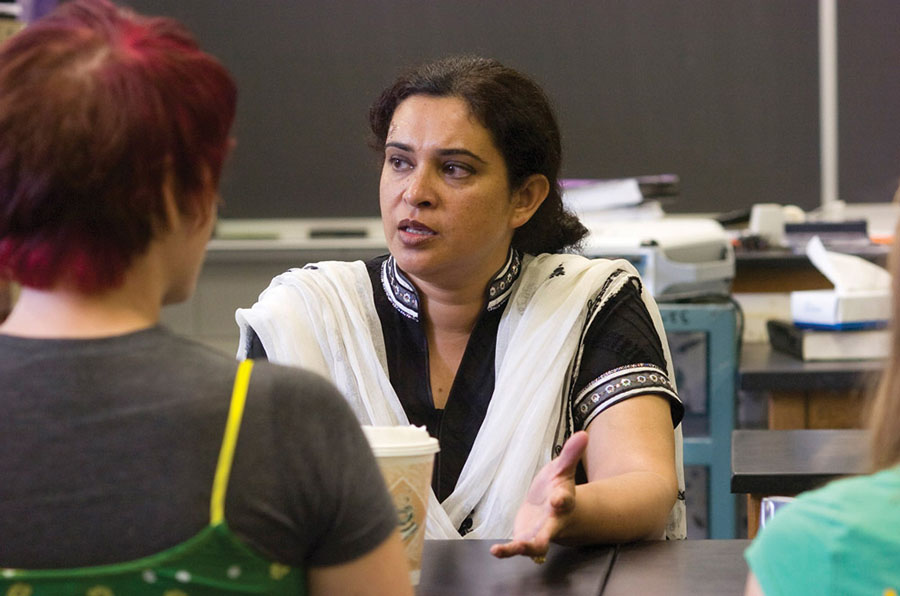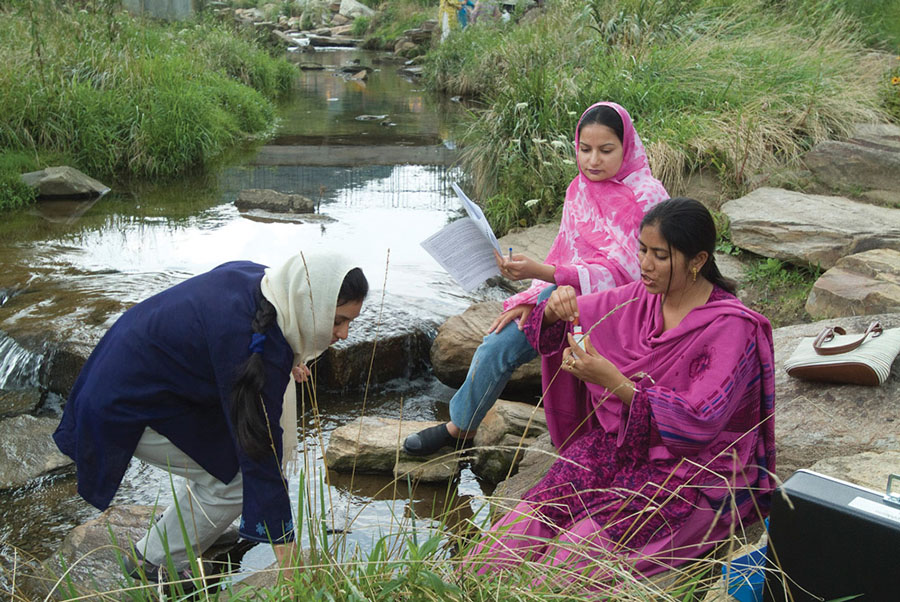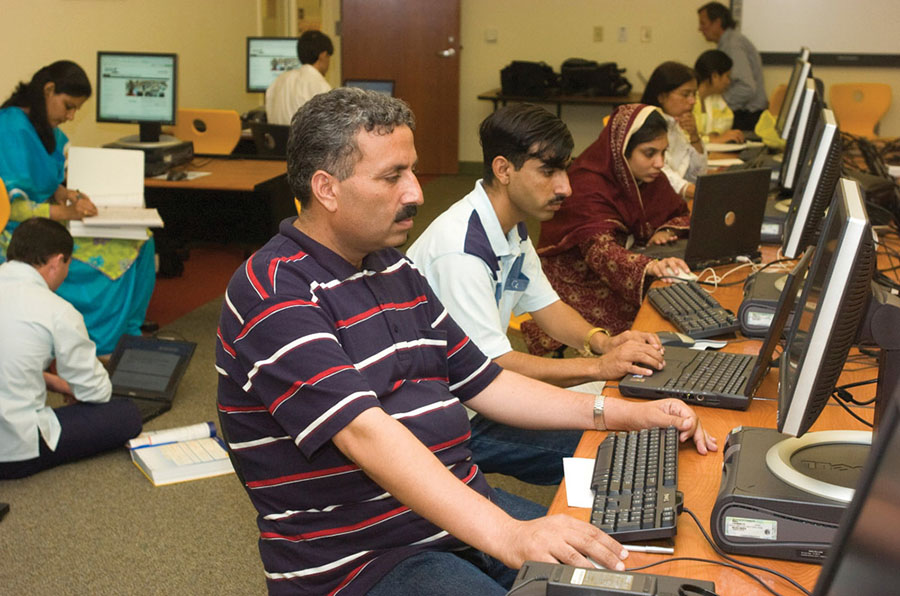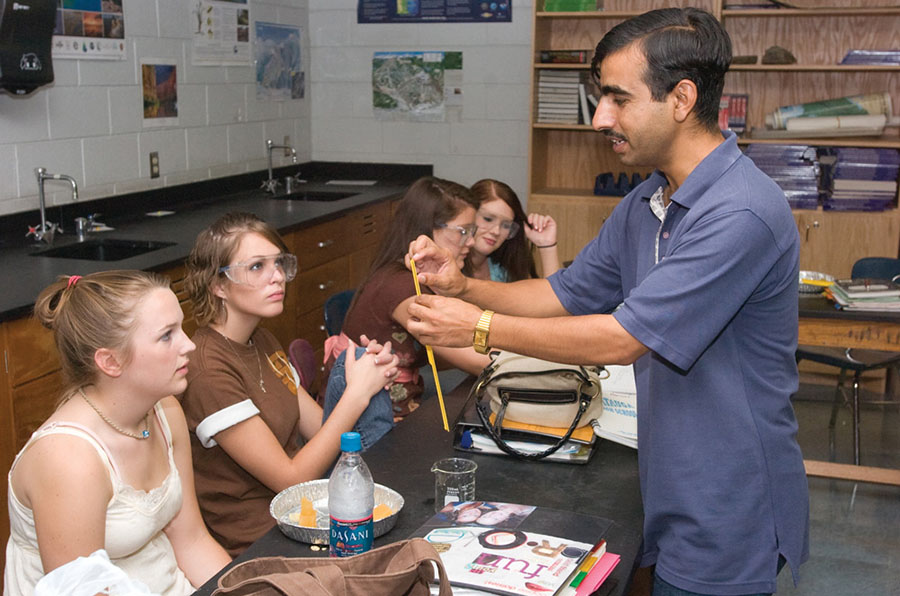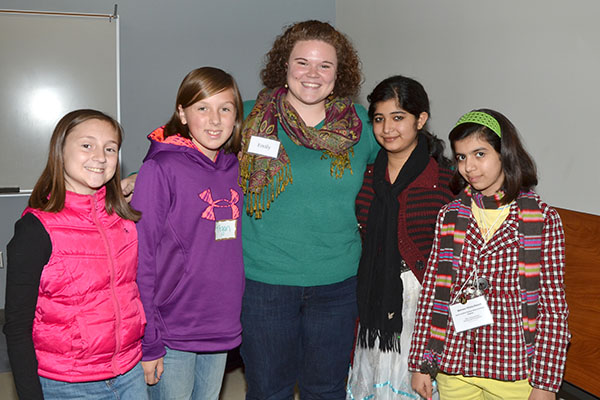Shazia Naz had never ventured outside of her country before, but a newspaper ad soliciting applicants for a summer academic institute in the United States changed all that.
Naz, who lives in the Sindh Province of Pakistan, was one of 15 secondary-level biology teachers selected by the Fulbright Commission to attend a six-week training program at Appalachian in July and August of 2007. They spent four weeks strengthening their skills in science, educational technology, teaching and English. Then, they spent two weeks applying what they learned by team teaching in Watauga County Schools. While in the public schools, they also shared information about their native culture with children in social studies and other non-science classes.
"Appalachian has a strong commitment and interest in expanding its service mission beyond the U.S. borders," said Jesse Lutabingwa, the university's associate vice chancellor for international education and development. "This project is part of the new effort by the Office of International Education and Development to engage Appalachian in international development and short-term training and exchange activities in the regions of the world where traditionally we have not been involved."
Pakistan and Boone may be a world apart, but for 15 Pakistani biology teachers this summer, Boone became home. Their six-week visit was enabled by a grant from the U.S. Department of State to Appalachian’s Office of International Education and Development.
The program was funded by a $124,782 grant from the U.S. Department of State through the International Institute of the U.S. Department of Agriculture Graduate School. Strengthening education in Pakistan and broadening mutual understanding between Americans and Pakistanis were its goals.
Despite concerns about Americans' perceptions of Pakistanis, dietary issues related to the Muslim faith, and a first-ever plane ride lasting more than 17 hours, Naz was eager to participate in the program.
Her motivation, like that of others chosen for the program, was to become a better teacher by learning new ways to teach. In Pakistan, teachers are specialists in their particular subject area but don't receive specific teacher training as their American counterparts do.
"We want to learn more about the different technologies and methodologies used (to teach) in the United States and integrate what we learn in our classes," Naz said.
Samina Haider from the Northwest Frontier Province said she has modeled her teaching methods on the techniques her teachers used when she was a student. "I haven't had any other exposure to teaching," she said. "Nowadays, whatever I am teaching is what I have seen my teachers doing. Through this opportunity, I am learning a lot about how American teachers plan their lessons and deal with their students."
Pakistan has a population of 164 million people. About 80 percent of Pakistan's schools are located in rural areas with inadequate facilities and an insufficient number of science and math teachers. Even so, education is a priority of the Pakistani government, which has placed a heavy emphasis on science education at all educational levels. And while most classes in Pakistan are comprised of lecture and rote memorization, the country is moving toward an inquiry-based learning model.
The Ministry of Education has implemented a science education project that has provided science equipment for laboratories and science kits for several schools and training for science teachers. The project has also facilitated the development of a new curriculum for 9th-10th grade physics, chemistry, biology and math, and 6th-8th grade general science classes. Beginning this fall, English will replace Urdu as the language of instruction for science, mathematics, and information technology in all state schools.
Syed Asim Bukhari from Pakistan's Punjab province said accessing resources through the Internet to help with his teaching is difficult in his country. "There are Web sites that are restricted in Pakistan. That creates some problems for me," he said.
John Spagnolo, a technology and curriculum specialist in the Reich College of Education, helped the teachers solve that problem by directing them to other Internet sources to help with their teaching. They developed skills with Web Editor and other software programs to create their own teaching materials for their students. "While they are not used to having an activity-based classroom, they are very excited about implementing these teaching methods," Spagnolo said.
The teachers also will be able to maintain contact with Appalachian professors and create online learning communities for their students and students in Watauga County.
Getting feedback on her teaching method was one of the most valuable aspects of the program, according to Haider, who learned how to develop effective teaching plans based on the five E's: engage, explore, explain, elaborate and evaluate.
Appalachian biology professor Max Dass said that approach is especially useful when teaching abstract concepts. "They saw how engaging the students through activities keeps them interested and curious throughout the lesson," he said.
"Now, it is clear in my mind the things I do that are very good and are helping the students, what I'm doing that might not help the students and how I can make them better. I was not getting this assurance in Pakistan," Haider said.
The teachers also learned that it doesn't always take a big budget or the latest technology to have effective learning materials, thanks to Dass and biology professor Michael Windelspecht. They took the teachers to Boone Creek on campus to test water samples and collect mushrooms. They learned to use empty soda bottles to create small aquatic and terrestrial ecosystems, and how to use an eye dropper and a small coin to teach about the properties of water molecules.
"We realized we can use everyday items that are around us to create activities that will increase student attention and interest in the class," Haider said.
Other teachers in Pakistan will benefit from the institute as well. "I came to gain knowledge," Naz said. "Whatever I learn here, I will implement in my school and share with the other teachers."
Jennifer Nupp, exchange program administrator with the USDA Graduate School's International Institute, said Appalachian did "a really excellent job of integrating several different kinds of curriculum" into the program.
"I'm very impressed that people with so many different backgrounds worked together. This has been a really good sharing experience for both sides. While in the public schools, the Pakistani teachers shared the similarities in what students in their country and students in our country are doing. It's good that students see that," she said.
"Learning about their culture really did make me see things differently," said Brooke Trivette, a sophomore at Watauga High School. "The experience was so interesting and the Pakistani teachers were fascinating."
Upon returning home, the teachers expressed to the Fulbright Commission their inspired energy from the Appalachian experience. "Just based on their reaction, I think this was one of the best programs we have done," said Grace Clark, executive director of the U.S. Education Foundation of Pakistan (Pakistan Fulbright Commission). "The need for good biology teachers is critical in Pakistan, and the enthusiasm of these teachers to spread what they have learned should go a long way."
About the Office of International Programs
Appalachian State University combines a strong liberal arts foundation with a comprehensive, pervasive and integrated commitment to global engagement. The Office of International Programs assists App State in fulfilling its global engagement mission by working to develop awareness, knowledge, appreciation and respect of cultural differences — in both domestic and international contexts — in the university’s students, faculty and staff, as well as in the surrounding communities. Learn more at https://international.appstate.edu.
About Appalachian State University
As a premier public institution, Appalachian State University prepares students to lead purposeful lives. App State is one of 17 campuses in the University of North Carolina System, with a national reputation for innovative teaching and opening access to a high-quality, cost-effective education. The university enrolls more than 21,000 students, has a low student-to-faculty ratio and offers more than 150 undergraduate and 80 graduate majors at its Boone and Hickory campuses and through App State Online. Learn more at https://www.appstate.edu.
What do you think?
Share your feedback on this story.
